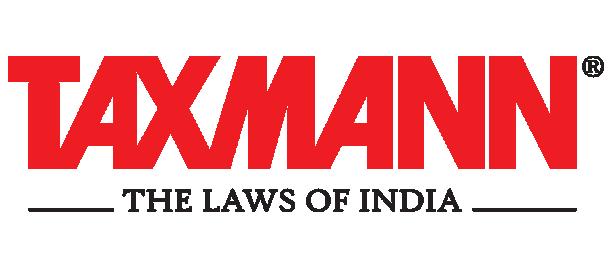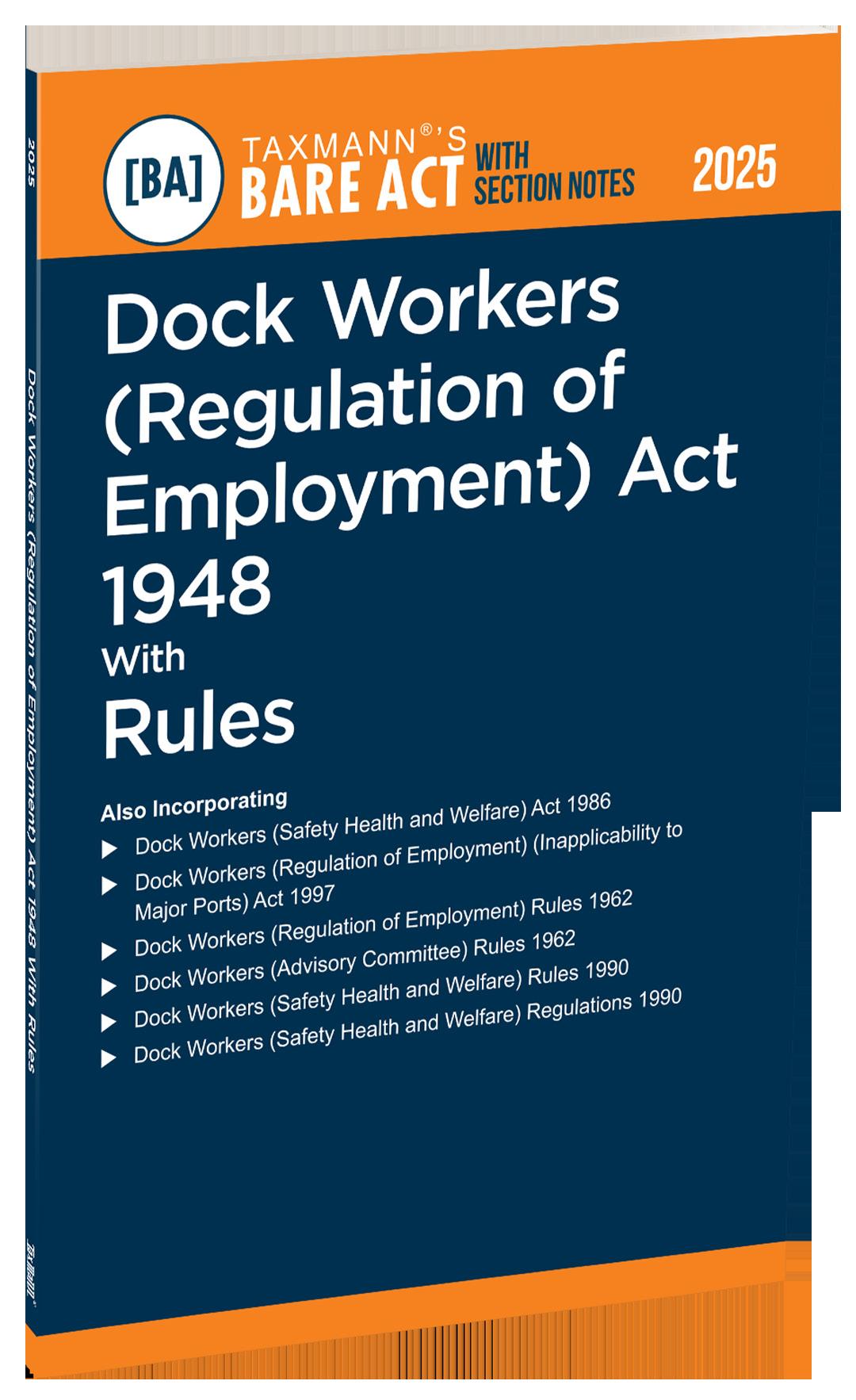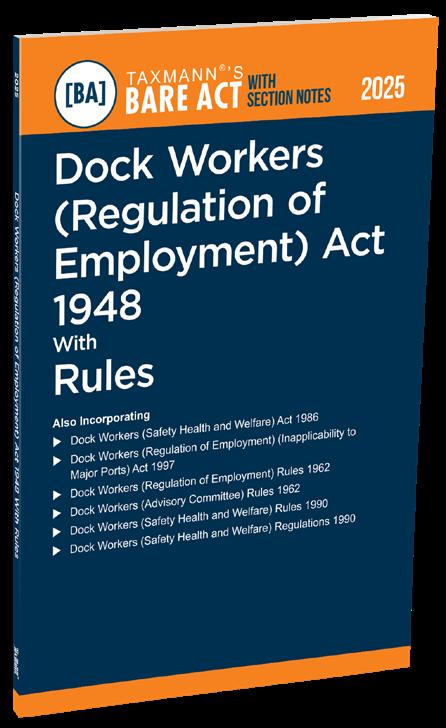







DOCK WORKERS (ADVISORY











[9 OF 1948]1
An Act to provide for regulating the employment of dock workers.
WHEREAS it is expedient to provide for regulating the employment of dock workers; It is hereby enacted as follows:—
Short title and extent.
1. (1) This Act may be called the Dock Workers (Regulation of Employment) Act, 1948.
(2)It extends to the whole of India 2[except the State of Jammu and Kashmir*].
Definitions.
2. In this Act, unless there is anything repugnant in the subject or context,—
3[(a) “Board” means a Dock Labour Board established under section 5A;]
4[(aa)] “cargo” includes anything carried or to be carried in a ship or other vessel;
(b)“dock worker” means a person employed or to be employed in, or in the vicinity of, any port on work in connection with the loading, unloading, movement or storage of cargoes, or work in connection with the preparation of ships or other vessels for the receipt or discharge of cargoes or leaving port;
(c) “employer”, in relation to a dock worker, means the person by whom he is employed or to be employed as aforesaid;
(d) “Government” means, in relation to any major port, the Central Government and, in relation to any other port, the State Government;
(e) “scheme” means a scheme made under this Act.
1. Dated 4-3-1948.
2. Substituted for “except Part B States” by the Part B States (Laws) Act, 1951, w.e.f. 1-4-1951.
3. Inserted by the Dock Workers (Regulation of Employment) Amendment Act, 1962, w.e.f. 1-61962.
4. Clause (a) re-lettered as clause (aa), ibid.
*This Act made applicable to the Union Territory of Jammu and Kashmir and Union Territory of Ladakh vide Notification No. S.O. 3912(E) dated 30-10-2019.
2.1 Dock Worker [Section 2(b)]
A dock worker refers to a person who is:
Currently employed or to be employed (i.e., includes prospective employment),
Location: Either:
Within a port, or In the vicinity of a port.
The work must relate to one or more of the following categories:
Cargo Handling:
Loading of cargoes;
Unloading of cargoes;
Movement of cargoes; Storage of cargoes.
Ship Operations:
Activities concerning the preparation of ships or other vessels for:
1. Receiving cargoes;
2. Discharging cargoes;
3. Departing from port.
Definition of Stevedore and Employer - Registration Rights - The Calcutta Dock Workers (Regulation of Employment) Scheme, 1951 and 1956, framed under the Dock Workers (Regulation of Employment) Act, 1948, differentiate between stevedores and other employers. The petitioners, engaged in the business of supplying tally clerks for cargo handling, contended that they were denied registration under the scheme despite employing dock workers. The Court clarified that the term “stevedore” refers to those directly involved in the stowing and discharging of cargo, while the petitioners acted merely as contractors providing tally clerks and did not meet this definition. The Court further held that the scheme does not limit registration exclusively to stevedores; employers who hire dock workers for related activities must also be eligible. The refusal to register the petitioners was found to be improper, and they were entitled to be registered as employers. - Kesab Lal Banerjee v. Calcutta Dock Labour Board AIR 1960 Calcutta 166.
Definition of Dock Workers - Applicability of Wage Board Recommendations - The Supreme Court considered whether bargemen, i.e., Majhis and Dandees, at Calcutta Port fell within the definition of “dock workers” under section 2(b) of the Dock Workers (Regulation of Employment) Act, 1948, and whether they were entitled to the benefits of the Wage Board’s recommendations for port and dock workers. The National Tribunal had held that bargemen, who were involved in cargo handling, were included within the definition of “dock workers” despite the Wage Board’s failure to make specific recommendations for them. The Supreme Court affirmed this decision, rejecting the view of the Calcutta High Court that the tribunal exceeded its jurisdiction. It held that the Wage Board’s recommendations were applicable to the bargemen and alternatively supported the tribunal’s independent wage determination based on fair wage principles.
The appeal was allowed, and the tribunal’s award was restored. Calcutta Port Shramik Union v. The Calcutta River Transport Association AIR 1988 SC 2168.
Definition of Dock Worker - The term “dock worker” under section 2(b) of the Dock Workers (Regulation of Employment) Act, 1948, includes not only those involved directly in loading, unloading, movement, or storage of cargo but also encompasses individuals engaged in preparatory work related to the arrival, handling, or departure of vessels. This definition was expanded to include sampling workers who are involved in taking samples as part of the cargo preparation process before export, as such activities are integral to the process of handling and preparing cargo for shipment. This broader interpretation affirms that sampling workers fall within the scope of “dock workers.”
- Dr. Raman C. Amin v. Dock Labour Board, Visakhapatnam 1990 LAB. I. C. 110.
Scheme for ensuring regular employment of workers.
3. (1) Provision may be made by a scheme for the registration of dock workers 5[and employers] with a view to ensuring greater regularity of employment and for regulating the employment of dock workers, whether registered or not, in a port.
(2) In particular, a scheme may provide—
(a) for the application of the scheme to such classes of dock workers and employers as may be specified therein;
(
b) for defining the obligations of dock workers and employers subject to the fulfilment of which the scheme may apply to them and the circumstances in which the scheme shall cease to apply to any dock workers or employers;
(
c) for regulating the recruitment and entry into the scheme of dock workers, 6[and the registration of dock workers and employers], including the maintenance of registers, the removal either temporarily or permanently, of names from the registers and the imposition of fees for registration;
(
d) for regulating the employment of dock workers, whether registered or not, and the terms and conditions of such employment, including rates of remuneration, hours of work and conditions as to holidays and pay in respect thereof;
(
e) for securing that, in respect of periods during which employment, or full employment, is not available for dock workers to whom the scheme applies and who are available for work, such workers will, subject to the conditions of the scheme, receive a minimum pay;
(
f) for prohibiting, restricting or otherwise controlling the employment of dock workers to whom the scheme does not apply and the employment of dock workers by employers to whom the scheme does not apply;
7[(ff) for creating such fund or funds as may be necessary or expedient for the purposes of the scheme and for the administration of such fund or funds;]
5. Inserted by the Dock Workers (Regulation of Employment) Amendment Act, 1962, w.e.f. 1-6-1962.
6. Substituted for “and their registration”, ibid.
7. Inserted by the Dock Workers (Regulation of Employment) Amendment Act, 1980, w.e.f. 29-11-1980.
(g) for the training 8[***] of dock workers, insofar as satisfactory provision therefor does not exist apart from the scheme;
9[(gg) for the welfare of the officers and other staff of the Board;]
(h) 10[***]
(i) for the manner in which, and the persons by whom, the cost of operating the scheme is to be defrayed;
11[(j) for constituting 12[***] the authority to be responsible for the administration of the scheme;]
(k) for such incidental and supplementary matters as may be necessary or expedient for the purposes of the scheme.
(3) A scheme may further provide that a contravention of any provision thereof shall be punishable with imprisonment for such term as may be specified but in no case exceeding three months in respect of a first contravention or six months in respect of any subsequent contravention, or with fine which may extend to such amount as may be specified but in no case exceeding five hundred rupees in respect of a first contravention or one thousand rupees in respect of any subsequent contravention, or with both imprisonment and fine as aforesaid.
Framing of Scheme - Legislative Power of Central Government - Section 3 of the Dock Workers (Regulation of Employment) Act, 1948, grants the Central Government the power to frame schemes for regulating the employment of dock workers. This power is legislative in nature, and any scheme framed under this section is considered a form of subordinate legislation. The Courts cannot compel the Government through a writ of mandamus to frame or amend such schemes, as this would interfere with the legislative discretion vested in the Government. The High Court also held that any challenge to this exercise of power on grounds of violation of Article 14 of the Constitution is not maintainable, as the power under section 3 is legislative rather than administrative.Union of India v. Cochin Port Labour Union 1994 LAB. I. C. 626.
Fundamental Right to Stevedoring Business - Licensing Requirement by Port Authority - Under the Dock Workers (Regulation of Employment) Act, 1948, and the 1956 Scheme, clause 15(1)(c) requires stevedores to obtain a license from the Port Authority as a precondition for registration. The petitioner challenged this provision, arguing that it violated their fundamental right to carry on business under Article 19(1)(g) of the Constitution. The court held that there is no inherent or fundamental right to carry on a specific business like stevedoring within a particular area owned and controlled
8. Words “and welfare” omitted by the Dock Workers (Safety, Health and Welfare) Act, 1986, w.e.f. 15-4-1987.
9. Inserted by the Dock Workers (Regulation of Employment) Amendment Act, 1970, w.e.f. 28-8-1970.
10. Clause (h) omitted by the Dock Workers (Safety, Health and Welfare) Act, 1986, w.e.f. 15-4-1987.
11. Substituted by the Dock Workers (Regulation of Employment) Amendment Act, 1949.
12. Words “whether as a body corporate or otherwise” omitted by the Dock Workers (Regulation of Employment) Amendment Act, 1962, w.e.f. 1-6-1962.
PUBLISHER : TAXMANN
DATE OF PUBLICATION : JUNE 2025
EDITION : 2025 EDITION
ISBN NO : 9789364555425
NO. OF PAGES : 168
BINDING TYPE : PAPERBACK


Dock Workers (Regulation of Employment) Act 1948 with Rules [Bare Act with Section Notes] by Taxmann provides a complete and up-to-date legal reference on the regulation, safety, and welfare of dock workers in India. This publication presents the bare text of the principal Act, relevant rules, amendments, and key allied statutes, supplemented by section-wise notes, judicial summaries, and cross-references for clarity on port labour administration.
This book is intended for the following audience:
• Legal Professionals, Judges & Law Firms
• Port Trusts, Employers, and HR Departments
• Government Officials, Labour Department & Inspectors
• Trade Unions & Worker Representatives
• Academicians & Law Students
• Consultants, Safety Officers & Regulatory Advisors
The Present Publication is the 2025 Edition, covering the amended and updated text of the Dock Workers (Regulation of Employment) Act [Act No. 9 of 1948] and Rules, with the following noteworthy features:
• [Authentic, Unabridged Text] Complete and amended text of the Dock Workers (Regulation of Employment) Act 1948
• [Latest Amendments Included] Covers all recent statutory changes and procedural requirements
• [Pre-amendment Footnotes] Previous provisions are provided in footnotes for historical context
• [Comprehensive Allied Material]
- Dock Workers (Regulation of Employment) Rules 1962
- Dock Workers (Advisory Committee) Rules 1962
- Dock Workers (Safety, Health and Welfare) Act 1986
- Associated Rules and Regulations
- Dock Workers (Regulation of Employment) (Inapplicability to Major Ports) Act 1997
• [Section Notes & Case Law] Clear notes and key judgments for every section
• [Practical Forms & Schedules] Formats for compliance, reporting, and inspections
• [User-friendly Structure] Subject index and clear headings for ease of navigation
• [Legislative History] Details on statutory amendments and evolution
• [Operational Focus] Serves as both a legal reference and a compliance manual